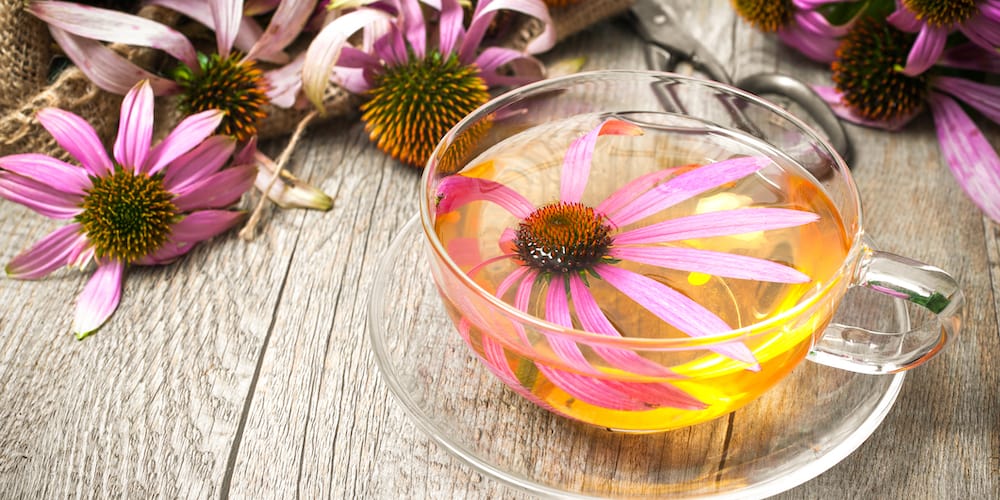Echinacea Tea Benefits & Side Effects Guide

Echinacea Tea benefits first became known when Native Americans consumed the plant centuries ago. Now, following years of extensive research, we have the scientific evidence to back these age-old claims.
Should you be interested in learning more, please keep reading our article to discover the facts, figures, history and health benefits of Echinacea Tea. You’re bound to be impressed by its potential.
The time will then come for you to buy it and try it yourself. Look no further than The Kent and Sussex Tea and Coffee Company, where every Loose Tea and Roast Coffee is of the finest quality and consistency.
This is because we pack each one by hand and fresh to order – as we’ve done since our founding in 1982. But let’s not get ahead of ourselves. What can the Herbal Tea do?
Table of Contents
Echinacea Tea Nutrition Facts
Echinacea Tea benefits first became known when Native Americans consumed the plant centuries ago. Now, following years of extensive research, we have the scientific evidence to back these age-old claims.
Should you be interested in learning more, please keep reading our article to discover the facts, figures, history and health benefits of Echinacea Tea. You’re bound to be impressed by its potential.
| Beta-Carotene | Chromium | Cichoric Acid |
| Flavonoids | Iron | Manganese |
| Niacin | Rosmarinic Acid | Selenium |
| Silicon | Vitamin C | Zinc |
The time will then come for you to buy it and try it yourself. Look no further than The Kent and Sussex Tea and Coffee Company, where every Loose Tea and Roast Coffee is of the finest quality and consistency.
This is because we pack each one by hand and fresh to order – as we’ve done since our founding in 1982. But let’s not get ahead of ourselves. What can the Herbal Tea do?

Echinacea Tea Health Benefits
Echinacea Tea’s traditional medicinals played a significant role in the indigenous communities of North America. The Sioux and Dakota once created a poultice out of its root to treat hydrophobia caused by rabid animal bites.
The Blackfoot instead chewed it to alleviate toothache. Then there were the Cheyenne and Comanche, who drank Echinacea Tea for sore throats and other oral issues.
That’s all fair and well. Indeed, we owe much to the Native Americans for uncovering the truth about such a remarkable plant. But what are Echinacea Tea’s benefits based on modern science?
Upon the discovery of antibiotics in the 1930s, the herb experienced a brief decline. However, in recent years, it has surged in popularity once more after countless studies have highlighted its value.
Does Echinacea Help with Colds and the Flu?
One of the most famous medicinal abilities is Echinacea Tea for colds and upper respiratory tract infections. According to a meta-analysis of 14 clinical trials, it decreased the chances of developing the minor illness by 58%. Furthermore, the research determined that it reduced the duration of symptoms by almost 1½ days.
Another study of 95 volunteers concluded that those involved had fewer instances of sore throats, mild fevers and runny noses.
And that’s not all. A 2008 study published in the Journal of Medicinal Food demonstrated that Echinacea Tea for the immune system served as a defence enhancer.
In 2015, a review established that it helped ward off recurrent respiratory tract infections and complications like pneumonia, tonsillitis and ear infections. There is also evidence indicating that it assists in treating influenza (flu).
Echinacea Tea for Weight Loss
Could Echinacea Tea’s effects extend to your waistline? It’s a possibility, at the very least. Admittedly, few studies exist to back the claim, although the long-maintained belief is that it might (emphasis on “might”) boost the metabolism of fat cells.
With a boosted metabolism comes the capacity to burn fat quicker and more efficiently, enabling periods of exercise to produce more noticeable changes.
One irrefutable fact is that it contains no more than two calories per 8-oz serving and is, therefore, an excellent alternative to sugary and fatty soft drinks. Nevertheless, there could be better options available, including Rooibos, Pu erh Tea and Matcha.
Remember that there is no fix-all solution to achieving your weight loss goals. You’ll have to eat well and exercise plenty to see the best results.

Echinacea for Skin Health
Looking after the skin’s vitality can be a challenge at times, especially for anyone living with conditions that cause blemishes. The good news is that according to a 2011 study published in the Journal of Phytotherapy Research, it benefits acne.
Scientists acknowledged that its potent anti-inflammatory and antibacterial properties suppressed breakouts before they developed.
In a 2017 study published in the Journal of Dermatological Science, the Tea’s topical application alleviated eczema symptoms and repaired damage. Before that, a 2010 study published in the International Journal of Cosmetic Science found that it improved skin hydration and reduced the appearance of wrinkles.
Who needs an expensive tub of skin cream when you could put the kettle on?
Echinacea Tea for Hair Health
We must again stress that few studies exist to support the claim that Echinacea Tea benefits for hair health are scientifically proven. But that doesn’t mean that it can’t still help, according to innumerable anecdotal reports.
The theory is that it stimulants the stem cells related to each hair follicle and promotes growth. It could even prevent early-onset alopecia (hair loss) due to its increasing blood circulation of the scalp.
The Tea’s anti-microbial and anti-inflammatory properties could likewise soothe an inflamed, irritated or itchy head, perhaps going as far as to alleviate dandruff. Yet, similar to its reported association with weight loss, there could be other infusions that might be worth trying first.
Among them are Milk Thistle and Nettle Tea Benefits, the latter of which has undergone substantial research on hair follicles.
Echinacea Tea for Sleep and Anxiety
Insomnia is when someone finds it difficult to fall asleep or keeps waking throughout the night. It affects between 10% and 30% of the world’s population and is most widespread in female adults or people with medical and mental health.
One condition that could exacerbate symptoms is anxiety, which, in turn, is a feeling of worry, fear or nervousness experienced over an extended period or at random intervals.
Echinacea Tea’s uses could aid both anxiety and insomnia. It contains chemical compounds such as alkamides, rosmarinic acid and caffeic acid that have calmative properties. In one animal-based study, three out of five Echinacea samples alleviated anxiety in mice.
Let’s not forget that there’s nothing more relaxing than sitting down with a nice, hot, nourishing cup of Herbal Tea, this also includes, Lavender Tea.

Echinacea for Cold Sores
Cold sores are the product of the herpes virus. They are contagious while present on your skin and might be irritating or even painful until they heal – usually within about ten days or less. The most common treatment is an antiviral cream.
However, you could also get over-the-counter cold sore patches or electric light or laser devices from a pharmacy that might reduce their appearance.
Another worthwhile consideration, recent scientific evidence has signalled, is consuming Loose Leaf Echinacea Tea for cold sores. A 2009 study published in the Journal of Intervirology showed that an extract from the plant exerted an antiviral action.
This prevented cold sores triggered by the herpes simplex virus (HSVI) from manifesting themselves in the first place.
Echinacea Tea Side Effects
Is Echinacea Tea safe under all circumstances? Unfortunately, it’s not the case. The most crucial correlation to recognise is between Echinacea Tea and autoimmune disease complications, especially Echinacea Tea and multiple sclerosis.
It is paramount that anyone with an autoimmune disease avoids consumption. If you come into contact with it, we’d always recommend seeking medical consultation.
Others have reported rare instances of it leading to rashes, itchy skin, hives, swelling, stomach pain, nausea or shortness of breathor even allergic reactions. These Echinacea Tea side effects are typical for anyone allergic to daisies, marigold, ragweed or Chrysanthemum Tea.
We must once more insist that if you have any concerns, you should speak with a doctor, nurse or another health professional before drinking.
Can You Drink Echinacea Tea While Pregnant?
What about Echinacea Tea and pregnancy? Few studies have been conducted to make a case either for or against its consumption in expecting mothers. Nevertheless, most midwives would urge you to err on the side of caution.
Can I drink Echinacea Tea while breastfeeding? Experts cite a fundamental lack of data as a reason to steer clear of it. Consider instead Fennel Tea, which has been prescribed as a galactagogue (something that boosts breast milk supply) since the ancient Greek period.
Studies have established a rise in parameters such as milk volume, fat content and infant weight gain with the Herbal Tea.
Summary
We’ve learned that, above all else, drinking an Echinacea immune support Tea prevents coughs, colds, the flu and other minor illnesses. Additionally, it could improve weight management, skin and hair health, sleeping patterns, anxiety and cold sores from the herpes virus.
Could it finally be time to indulge in a cuppa? The Kent and Sussex Tea and Coffee Company awaits your order!

 Loose Leaf Tea
Loose Leaf Tea Pyramids
Pyramids Tea Bags
Tea Bags Africa
Africa Assam
Assam Ceylon
Ceylon Chinese
Chinese Darjeeling
Darjeeling European
European Indian
Indian Japan
Japan Nepal
Nepal South East Asia
South East Asia Ayurveda Tea
Ayurveda Tea Black Tea
Black Tea Chai Tea
Chai Tea Flowering Tea
Flowering Tea Fruit Tisanes
Fruit Tisanes Green Tea
Green Tea Herbal Tea
Herbal Tea Matcha Tea
Matcha Tea Oolong Tea
Oolong Tea Organic Tea
Organic Tea Pu erh Tea
Pu erh Tea Rooibos Tea
Rooibos Tea White Tea
White Tea Asian Coffee
Asian Coffee Caribbean Coffee
Caribbean Coffee Central American Coffee
Central American Coffee South American Coffee
South American Coffee Coffee Blends
Coffee Blends Decaffeinated Coffee
Decaffeinated Coffee Espresso Coffee
Espresso Coffee Ethically Sourced Coffee
Ethically Sourced Coffee Flavoured Coffee
Flavoured Coffee Organic Coffee
Organic Coffee Single Origin Coffee
Single Origin Coffee Chocolate 1
Chocolate 1 Chocolate 2
Chocolate 2 Chocolate 3
Chocolate 3 Chocolate 4
Chocolate 4 Chocolate 5
Chocolate 5 Chocolate 6
Chocolate 6 Chocolate 7
Chocolate 7 Chocolate 8
Chocolate 8 Chocolate 9
Chocolate 9 Loose Tea Filters
Loose Tea Filters Tea Accessories
Tea Accessories Tea Bricks
Tea Bricks Tea Caddies
Tea Caddies Tea Caddy Spoons
Tea Caddy Spoons Tea Gift Ideas
Tea Gift Ideas Tea Infusers
Tea Infusers Tea Strainers
Tea Strainers